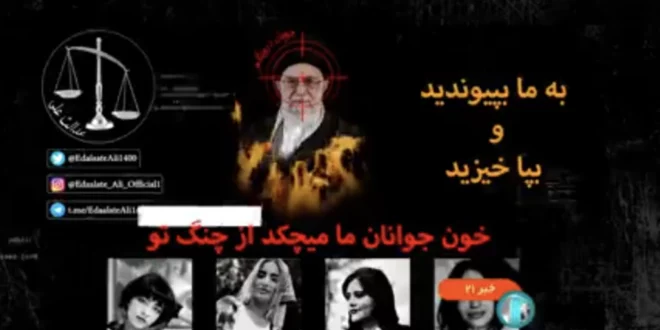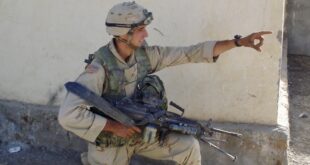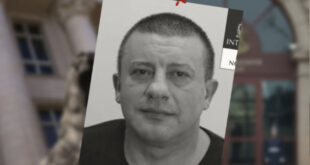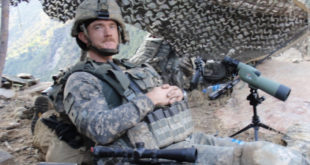Activists in Iran hacked into a live state television broadcast, airing an image of Supreme Leader Ayatollah Ali Khamenei in the crosshairs, along with messages in support of continuing protests against the government’s strict hijab law requiring women to wear head scarves.
Islamic Republic TV footage of Supreme Leader Ayatollah Ali Khamenei meeting state officials was interrupted on Oct. 8 and replaced with images of slain protesters and 22-year-old Mahsa Amini, whose death in police custody last month after being arrested for not wearing a head scarf sparked nationwide protests.
An image showing Khamenei in crosshairs and in flames was aired during the TV interruption, for which the hacktivist group Edalat-e Ali took credit. The images were accompanied by the words “join us and rise up.”
The semiofficial Tasnim news agency confirmed that the state TV news broadcast “was hacked for a few moments by anti-revolutionary agents.”
Hassanein Haddad, a spokesman for Iran State Radio and Television, said that the incident was not a hack, but an act of “vandalism and infiltration” from within the channel itself.
More scattered protests and violence struck Iran on Oct. 8 as demonstrators angry over the death of a young woman detained over the dress code continued to defy officials’ warnings of tough punishments.
Videos posted on social media from trusted sources showed small protests just outside the capital, and a few other cities.
There were also reports of striking workers in several cities in heavily Kurdish areas, where public outcry was initially strongest when word spread that 22-year-old Mahsa Amini died three days after being picked up in the capital by Iran’s morality police.
The Oslo-based Iran Human Rights group said at least 92 protesters have been killed by the security forces, although other groups cite death figures of 160 or more, along with hundreds more injured and thousands arrested.
A Norway-based network of human rights campaigners which monitors abuses in heavily Kurdish northwestern Iran said Iranian riot police opened fire on people in at least two cities on October 8, with the protests in their fourth week.
“Security forces are shooting at the protesters in Sanandaj and Saqqez,” said the Hengaw Organization for Human Rights.
They also used tear gas against crowds, the group said.
The group later said clashes were continuing into the night in Sanandaj and Saqez, along with Kermansha, Bukan, and Fardis.
A widely followed Twitter account called Tavsir1500 reported shootings at protesters in Sanandaj and Saqez..
Videos shared by Hengaw showed young women or girls chanting “Woman, life, freedom!” at a school in Saqez, Amini’s hometown in Kurdistan Province.
Others waved their mandatory Islamic head scarves in the air in a daring challenge to the strict hijab laws that have been part of systemic discrimination against women and girls under Iran’s religious leadership since the 1979 revolution.
In another video it shared, a group of girls could be heard chanting the same phrase — the catchcry of the protests — as they entered a school in Sanandaj, the capital of Kurdistan Province.
Another video Hengaw claimed was from Sanandaj showed a driver slumped at the wheel after the group claimed he was shot dead while honking amid a street demonstration.
AFP confirmed the presence of a large banner on an overpass in central Tehran that read, “We are not afraid anymore. We will fight.”
Iranian expulsions, censorship, and interrupted communications make reporting inside the country difficult.
Eyewitness accounts said Amini had been beaten during her arrest, while her father has said she suffered bruises to her legs and has held the police responsible for her death.
The state-controlled ISNA news agency said on October 7 that Iran’s Forensic Medicine Organization had determined “underlying diseases” were the cause of Amini’s death, while making no mention of whether she had suffered any injuries. A report on state television added that the forensic report showed Amini’s death was related to “surgery for a brain tumor at the age of 8.”
The street protests quickly spread after officials denied the dress-code enforcers were responsible before any investigations were done, and senior leaders including Supreme Leader Ayatollah Ali Khamenei have since suggested that foreign elements are behind the unrest.
Hard-line President Ebrahim Raisi has made similar charges, including at a ceremony on October 8 at Tehran University to mark the start of the new academic year.
After Raisi addressed professors and students at the female-only Alzahra University in Tehran, women students were seen on video posted on social media chanting “Raisi get lost” and “Mullahs get lost.”
The Oslo-based group Iran Human Rights said young women on the campus were seen shouting “Death to the oppressor.”
Reported by RFE/RL
 Soldier of Fortune Magazine The Journal of Professional Adventurers
Soldier of Fortune Magazine The Journal of Professional Adventurers






